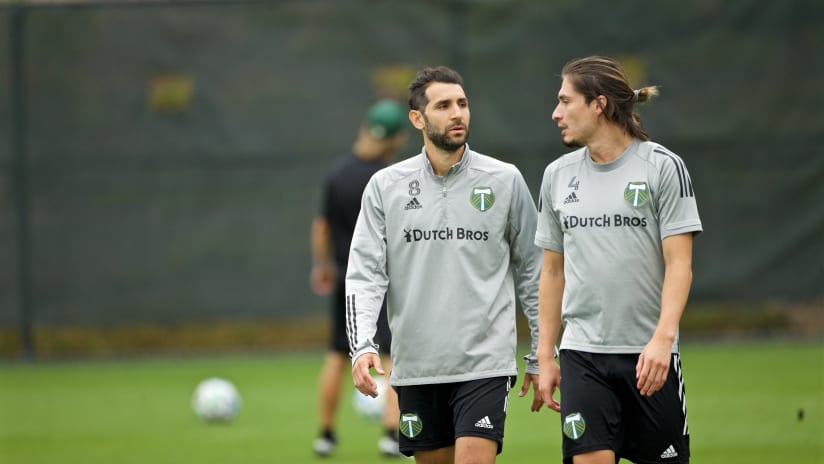BEAVERTON, Ore. – Shortly before noon on Friday, the Portland Timbers set foot on their Beaverton, Oregon, training field.
During most weeks, that fact would be too mundane to note, but one day before a trip to San Jose, California, to face the Earthquakes, the Timbers were training outdoors for the first time in nine days. The air quality in the wildfire-stricken Northwest was finally good enough for some light, limited work.
“It is great to at least be able to be 20 minutes on the field,” head coach Giovanni Savarese said before practice, “which is what we're planning to do.”
Air quality in the Portland metropolitan area over the last week-plus had forced the Timbers to train indoors, with the team unable to prepare on a full-sized field before Wednesday’s 1-1 draw in San Jose. Though that air quality was still far from perfect on Friday in Beaverton – an air quality index of 144 still cast conditions as “Unhealthy for Sensitive Groups” – the team was at least able to finalize Saturday’s plans in a space closer to Earthquakes Stadium’s dimensions.
“Even though we practiced and did things [before],” Savarese said, “practicing indoors is not the same. Now, we're going [to San Jose] with a better understanding of what the expectation will be.”
So check one obstacle off Portland’s list, for now. But the congestion of a five-games-in-15-days stretch remains, along with a new challenge that surfaced on Wednesday.
As seen on television, the field at Earthquakes Stadium became riddled with divots early in Wednesday’s match, with FOX Sports’ broadcast reporting the Bay Area’s own wildfire problems had made it difficult to properly maintain the field. Over the course of the match, memories of Portland’s ill-fated playoff game at Houston in 2017 became more relevant. Back then, Diego Chara’s season came to an end thanks to a broken foot. There were no similar injuries in San Jose.
For Savarese, the “holes” in the field are a concern. “I am not one that likes to emphasize other stadiums, other fields, other situations,” he said, “but in this case, the field was definitely not in good condition.” His main concern, though, is a preexisting issue, one “that already we know well because we have played there before.”
“On one side, [the field] is a lot more wet than on the other side,” he said. “You can expect guys sliding, losing their balance.
“But it's something that we know about the field: that when you travel, you have to be smart in the way you are able to play on that side. That is the area you have to be more concerned.”
In that sense, the Timbers’ Earthquakes Stadium obstacle is not unique. Every team that plays in San Jose has to adjust. Likewise, the Timbers are not the only team dealing with schedule congestion, and while theirs has been worsened by a rescheduled game – August 26th in San Jose being moved to Wednesday – too many games in too few days is a MLS-wide reality, at the moment.
“We have to understand that in order for us to be able to put together the amount of games that we needed to play,” Savarese said, “this is the only way, from what we understand.
“We have to embrace it. We have to have a strong mentality. And we have to utilize our roster the best possible way to endure this difficult period.”
For players like team captain Diego Valeri, that means less certainty about playing time, and more time on the bench. “No player can endure playing every single match,” Savarese said, part of the reason why Valeri was an unused sub during Wednesday’s draw.
For Portland’s captain, preparing amid lineup rotations is no different than life with a normal, spaced-out schedule.
“As players, we just think about the next game,” Valeri explained. “It's worse for us to think about other stuff, and obviously the coaching staff has to make decisions, thinking about what's best for the next game: depending on the [opponent]; depending on other, physical [factors] that come from other parts of the coaching staff.
“As players, we have to think of the minutes we [will have] in the next game, and [then think about] the next game, and [then] the next game to figure out how to perform ... and keep getting points to be in a good position for our goal, which is the playoffs.”
To that end, Valeri did see one advantage Wednesday’s rest – observing while knowing he and the team would be facing the same opponent, in the same stadium, in three days.
“It's going to help, seeing how [San Jose] played a couple of days ago,” he said, “to see how it is best to break them down, to play a good game, to take advantage in the areas we believe we can take it.”












